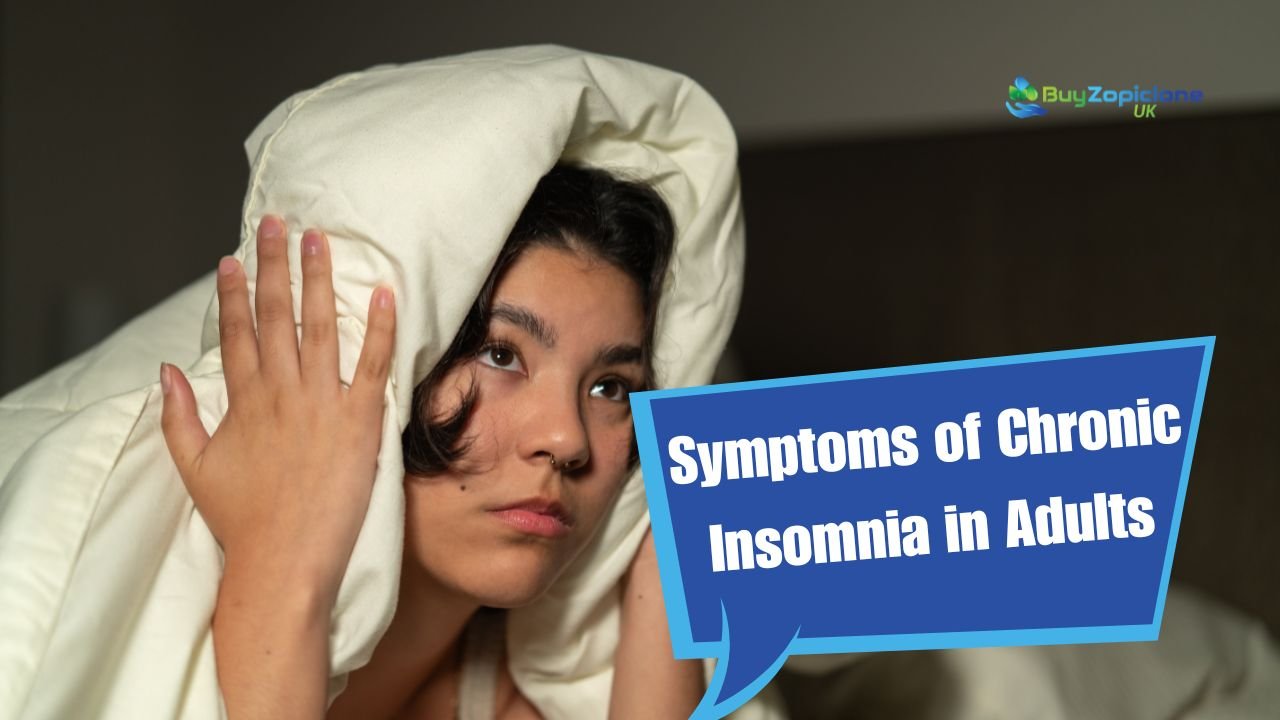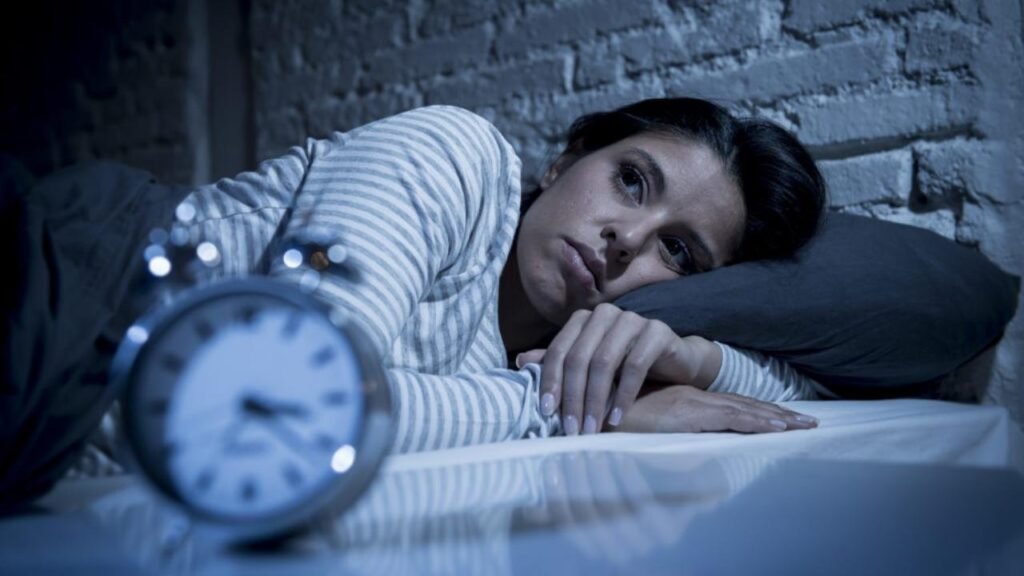Sleep is the body’s natural way to recharge, restore, and maintain overall health—but for millions of adults, restful sleep remains out of reach. Chronic insomnia is one of the most common adult sleep disorders, affecting up to 10–15% of the population globally. Unlike occasional sleeplessness, which may occur due to stress or temporary changes in routine, chronic insomnia persists for weeks, even months, and significantly interferes with daily life.
If you’re frequently lying awake at night, waking up multiple times, or struggling with fatigue during the day despite getting hours in bed, you may be facing more than just bad sleep—you could be dealing with chronic insomnia.
In this blog post, we’ll explore the key symptoms of chronic insomnia in adults, what causes it, how it affects your health, and the best treatment options available. Whether you’re searching for answers for yourself or a loved one, understanding the early signs can be the first step toward better sleep and improved well-being.
What is Chronic Insomnia?
Chronic insomnia is more than just a few nights of tossing and turning. It’s a persistent sleep disorder that interferes with your ability to fall asleep, stay asleep, or return to sleep after waking up. For a diagnosis of chronic insomnia, symptoms must occur at least three nights per week and persist for a minimum of three months.
This condition can affect anyone, but it is especially common among adults over 40, shift workers, individuals with high stress levels, and those living with mental health conditions such as anxiety or depression. Insomnia can occur on its own (primary insomnia) or be linked to other medical or psychological conditions (secondary insomnia).
Unlike short-term or acute insomnia—which is often triggered by temporary events like travel, exams, or stress—chronic insomnia lingers even after the initial cause has resolved. It can create a frustrating cycle: anxiety about not sleeping makes it even harder to fall asleep, leading to chronic sleep problems.
People with chronic insomnia often find that even when they do sleep, the sleep is light, restless, or unrefreshing. Over time, this can lead to daytime fatigue, mood disturbances, and difficulty concentrating—symptoms that can severely impact work performance, relationships, and overall health.
Understanding what chronic insomnia is—and what it isn’t—is the first step in recognizing its symptoms and seeking treatment.
Causes of Chronic Insomnia in Adults
Identifying the root cause of chronic insomnia is crucial for effective treatment. In many cases, insomnia doesn’t appear out of nowhere—it’s often a symptom of an underlying issue. Here are some of the most common causes of chronic insomnia in adults:
Mental Health Conditions
Anxiety disorders, depression, PTSD, and chronic stress are leading causes of insomnia. Worrying thoughts, racing minds, and emotional turmoil can make it hard to fall asleep or stay asleep. In fact, insomnia is often one of the first signs of anxiety or depression.
Medical Conditions
Several health issues are known to disrupt sleep. These include:
- Chronic pain (arthritis, fibromyalgia)
- Acid reflux (GERD)
- Asthma or breathing disorders
- Neurological conditions (e.g., Parkinson’s, Alzheimer’s)
- Hormonal changes (menopause, thyroid imbalance)
Lifestyle Factors
Habits such as excessive caffeine or alcohol consumption, late-night eating, irregular sleep schedules, and lack of physical activity can all contribute to sleep problems in adults.
Poor Sleep Hygiene
Spending too much time on screens before bed, inconsistent bedtimes, uncomfortable sleep environments, and light exposure during nighttime hours are environmental triggers that can worsen insomnia.
Shift Work or Jet Lag
Disruptions to the circadian rhythm, such as rotating work shifts or frequent travel across time zones, can confuse the body’s internal clock and lead to long-term sleep disturbances.
Understanding what’s causing your insomnia is the first step toward managing and eventually overcoming it.
Key Symptoms of Chronic Insomnia in Adults
When occasional sleeplessness becomes the norm, it’s important to look for the signs of chronic insomnia. Unlike a few bad nights, chronic insomnia in adults presents a recurring pattern that negatively impacts both nighttime rest and daytime functioning.
Here are the key symptoms of chronic insomnia to watch for:
1. Difficulty Falling Asleep
If you regularly lie in bed for more than 30–45 minutes before dozing off, this is a classic symptom. Many people with insomnia describe racing thoughts, physical restlessness, or anxiety when trying to fall asleep.
2. Frequent Nighttime Awakenings
Waking up multiple times during the night—and struggling to return to sleep—is a common complaint. Even small noises, temperature changes, or thoughts can trigger awakenings in those with sleep disturbances.
3. Waking Up Too Early
Many adults with chronic insomnia wake up much earlier than planned and find it impossible to fall back asleep. This pattern often leaves them feeling unrested and frustrated before the day even begins.
4. Daytime Fatigue and Low Energy
One of the most obvious consequences of insomnia is persistent tiredness during the day. Even after spending 7–8 hours in bed, the sleep is not restorative. You may feel physically drained, mentally foggy, and lacking motivation.
5. Mood Disturbances
Irritability, anxiety, and even depression are common among adults dealing with chronic insomnia. The emotional toll of poor sleep can lead to a negative cycle, where your frustration over not sleeping only makes it harder to relax at night.
6. Difficulty Concentrating or Remembering Things
Sleep is vital for brain function. If you’re constantly forgetting details, struggling with decision-making, or feeling mentally “cloudy,” insomnia could be the culprit.
7. Sleep-Related Anxiety
Many insomnia sufferers dread bedtime. They associate the bedroom with frustration or fear of not being able to sleep, which ironically makes sleep even more difficult. This phenomenon is known as psychophysiological insomnia.
8. Physical Symptoms
Chronic insomnia can manifest physically too, with headaches, digestive problems, muscle tension, or a generally weakened immune response.
Recognizing Patterns
If you’ve experienced two or more of these symptoms for three nights a week or more, for over three months, it may be time to consider that you’re facing chronic insomnia—not just occasional poor sleep.
Early recognition of these symptoms allows for timely intervention, lifestyle changes, and, if needed, professional treatment before the condition worsens or becomes more deeply rooted.
Effects of Untreated Chronic Insomnia
Left untreated, chronic insomnia can have a ripple effect on nearly every aspect of your physical, mental, and emotional well-being. What starts as occasional sleeplessness can quickly evolve into a cycle of chronic sleep deprivation—and the consequences are far more serious than simply feeling tired.
Physical Health Consequences
Prolonged lack of sleep affects your body at the cellular level. Studies have shown that chronic insomnia increases the risk of:
- High blood pressure and heart disease
- Type 2 diabetes
- Obesity, due to hormonal imbalances that affect appetite and metabolism
- Weakened immune function, making you more susceptible to illness
Mental and Cognitive Impacts
Sleep is essential for brain repair and memory consolidation. Long-term sleep loss can lead to:
- Impaired concentration, memory loss, and poor decision-making
- Increased anxiety, depression, and emotional instability
- Heightened risk of developing mood disorders
Decline in Quality of Life
From missed workdays and reduced productivity to relationship difficulties and social withdrawal, chronic insomnia can severely affect your daily functioning. It becomes harder to enjoy activities, meet obligations, and maintain emotional balance.
In the long run, insomnia doesn’t just disrupt your nights—it diminishes the quality of your days. Recognizing the serious effects of insomnia is crucial for motivating long-term change and treatment.
How Chronic Insomnia is Diagnosed
Many adults live with chronic insomnia for months or even years without realizing it’s a clinically diagnosable condition. Understanding how insomnia is diagnosed is key to getting the right treatment and reclaiming your sleep health.
Initial Evaluation
The first step usually involves a consultation with your primary care physician or a sleep specialist. You’ll be asked about:
- Your sleep habits and daily routine
- How long your sleep problems have persisted
- How your lack of sleep is affecting your life
This may include questionnaires like the Insomnia Severity Index (ISI) to assess the intensity of your symptoms.
Sleep Diary & Tracking
You may be asked to maintain a sleep diary for 1–2 weeks. This includes details like bedtime, wake time, nighttime awakenings, naps, and caffeine intake. Some doctors may recommend wearable sleep trackers or mobile apps to support diagnosis.
Sleep Studies (If Needed)
If other sleep disorders such as sleep apnea, restless leg syndrome, or narcolepsy are suspected, a polysomnography (overnight sleep study) may be conducted in a sleep lab.
Getting a proper diagnosis of insomnia helps rule out underlying medical conditions and ensures the right combination of behavioral and medical interventions is prescribed.
Treatment Options for Chronic Insomnia
Treating chronic insomnia requires more than just occasional melatonin or herbal tea. It involves a comprehensive approach that addresses both the symptoms and the root causes of your sleep disruption. The good news? There are several effective treatment options for chronic insomnia—many of which don’t involve long-term medication use.
1. Cognitive Behavioral Therapy for Insomnia (CBT-I)
This is considered the gold standard in insomnia treatment. CBT-I helps individuals:
- Identify and change negative thoughts about sleep
- Replace unhelpful sleep habits with healthy routines
- Learn relaxation techniques and stimulus control
CBT-I can be done with a trained therapist or through digital apps designed specifically for sleep disorders.
2. Sleep Hygiene & Lifestyle Changes
Improving sleep hygiene is often the first line of defense. This includes:
- Going to bed and waking up at the same time daily
- Creating a cool, dark, quiet bedroom environment
- Avoiding screens, caffeine, and heavy meals before bed
- Getting regular exercise (but not too close to bedtime)
3. Medications & Supplements
For some individuals, short-term use of sleep aids may be helpful:
- Prescription medications like Zopiclone or non-benzodiazepines (use under doctor supervision)
- Over-the-counter remedies like antihistamines (limited effectiveness)
- Natural supplements like melatonin, magnesium, and valerian root
Medication is typically recommended only as a short-term solution, especially if underlying conditions haven’t been addressed.
4. Complementary Therapies
Many adults find relief through:
- Mindfulness meditation and yoga
- Acupuncture
- Aromatherapy and essential oils (lavender, chamomile)
These approaches may not “cure” insomnia but can reduce stress and support relaxation.
The best treatment often combines behavioral therapy, lifestyle changes, and if needed, short-term pharmaceutical support—tailored to your specific situation.
Tips for Managing and Preventing Chronic Insomnia
Preventing and managing chronic insomnia isn’t just about treating the symptoms—it’s about creating the right habits and environment that promote healthy sleep over the long term. Whether you’re recovering from insomnia or trying to prevent it from becoming chronic, these evidence-based tips can help improve your adult sleep health:
Stick to a Consistent Sleep Schedule
Go to bed and wake up at the same time every day—even on weekends. This helps regulate your circadian rhythm and conditions your body to fall asleep naturally.
Create a Bedtime Routine
Engage in calming pre-sleep activities like reading, stretching, or listening to soft music. A wind-down routine helps signal to your body that it’s time to sleep.
Limit Stimulants & Screens
Avoid caffeine, nicotine, alcohol, and heavy meals within a few hours of bedtime. Turn off screens at least 60 minutes before sleeping—blue light interferes with melatonin production.
Optimize Your Sleep Environment
Make your bedroom a sleep sanctuary: cool, dark, and quiet. Use blackout curtains, white noise machines, or eye masks to minimize disruptions.
Manage Stress During the Day
Use techniques like deep breathing, mindfulness meditation, journaling, or talking to a therapist to deal with anxiety that could carry into the night.
These practical strategies don’t just help you sleep better at night—they empower you to take control of your long-term sleep health
When to Seek Professional Help
While occasional sleepless nights are common, chronic insomnia in adults should never be ignored. If your sleep problems have persisted for more than three months, or if they’re starting to impact your mental focus, mood, physical health, or relationships, it’s time to speak with a healthcare professional.
A doctor or sleep specialist can help determine whether your symptoms are due to primary insomnia, an underlying medical condition, or another sleep disorder like sleep apnea or restless leg syndrome. The sooner you get a proper diagnosis, the sooner you can begin personalized treatment—whether that’s CBT-I, lifestyle changes, or medication.
Don’t wait until chronic sleep deprivation affects your career, health, or relationships. Quality sleep is essential, not optional—and professional help can make a real difference.
Final Thoughts
Chronic insomnia in adults is more than just an inconvenience—it’s a serious sleep disorder that can impact every area of your life if left untreated. From difficulty falling asleep to persistent daytime fatigue, mood swings, and cognitive issues, the symptoms can be subtle at first but grow more disruptive over time.
The good news? Insomnia is treatable. Whether through cognitive behavioral therapy, better sleep hygiene, or targeted medical support, there are proven strategies to help you reclaim your rest—and your life.
If you recognize any of the symptoms of chronic insomnia discussed in this article, take them seriously. Don’t normalize sleepless nights. Start by tracking your sleep, adjusting your routines, and reaching out to a qualified professional.
Because when you sleep better, you live better.
Frequently Asked Questions (FAQs)
What are the most common symptoms of chronic insomnia?
The most common symptoms include trouble falling asleep, frequent nighttime awakenings, early morning waking, daytime fatigue, irritability, and difficulty concentrating.
How do I know if I have chronic insomnia?
If you’re experiencing sleep problems at least 3 nights per week for 3 months or more, and it’s affecting your daily life, you likely have chronic insomnia. A sleep diary or consultation with a doctor can confirm the diagnosis.
Can insomnia go away on its own?
In some cases, acute insomnia may resolve without treatment. However, chronic insomnia often requires intervention such as behavioral therapy or lifestyle changes to break the cycle.
What happens if chronic insomnia is left untreated?
Untreated chronic insomnia can lead to mental health issues, weakened immunity, increased risk of heart disease, and impaired cognitive function. It can also contribute to anxiety and depression.
What is the best treatment for chronic insomnia?
Cognitive Behavioral Therapy for Insomnia (CBT-I) is considered the most effective long-term treatment. Lifestyle changes and, in some cases, short-term medication may also help.
Also Read: How Much Sleep Do We Really Need?





